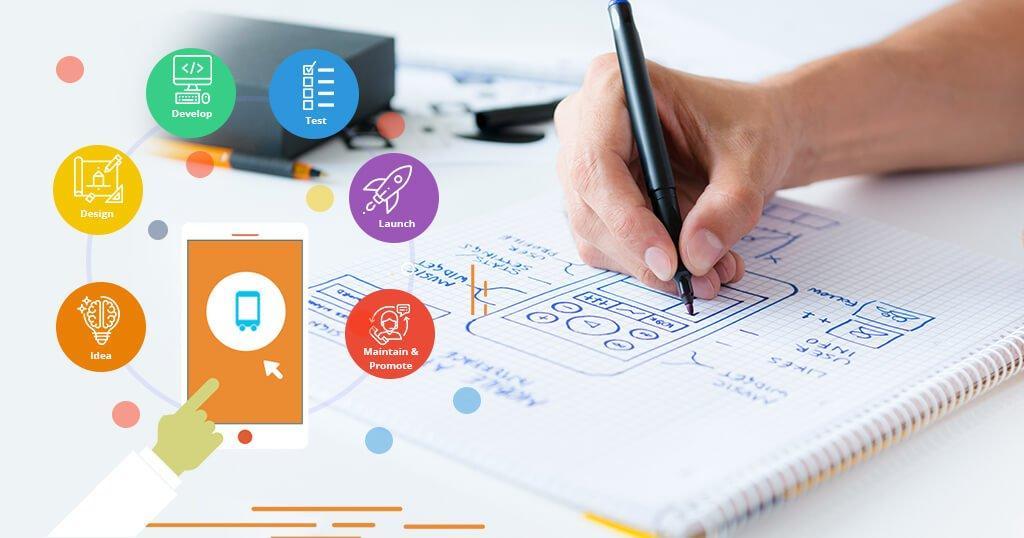In the dynamic landscape of the United Arab Emirates (UAE), where innovation and technology intersect with tradition and luxury, the demand for cutting-edge mobile applications continues to soar. From enhancing business efficiency to revolutionizing user experiences, mobile apps play a pivotal role in shaping the digital ecosystem of the UAE. As a leading provider of innovative solutions, BlueVision is proud to present a comprehensive guide to app development in the UAE, exploring the latest trends, challenges, and opportunities in this thriving industry.
The Mobile App Landscape in the UAE:

The UAE boasts one of the most digitally connected populations in the world, with high smartphone penetration rates and a tech-savvy consumer base. From Dubai’s bustling metropolis to Abu Dhabi’s cultural hub, mobile apps have become an integral part of everyday life for residents and visitors alike.
Market Trends and Insights:
- The UAE app market is characterized by a diverse range of sectors, including e-commerce, healthcare, finance, transportation, and entertainment.
- With the rise of digital transformation initiatives and the adoption of smart city technologies, demand for innovative mobile apps that cater to the unique needs and preferences of UAE consumers continues to grow.
Emerging Technologies:
- The UAE is at the forefront of embracing emerging technologies such as artificial intelligence (AI), augmented reality (AR), virtual reality (VR), and blockchain.
- Mobile app developers in the UAE are leveraging these technologies to create immersive, personalized, and interactive experiences that drive user engagement and deliver tangible business value.
Challenges and Opportunities in App Development:
While the UAE offers a fertile ground for app development and innovation, developers face a myriad of challenges and opportunities in navigating this competitive landscape.
Regulatory Compliance:
- App developers must navigate a complex regulatory environment in the UAE, including data protection laws, cybersecurity regulations, and licensing requirements.
- Ensuring compliance with local regulations while maintaining the highest standards of data privacy and security is essential for success in the UAE market.
Localization and Cultural Sensitivity:
- Cultural sensitivity and localization are critical considerations for app developers looking to succeed in the UAE market.
- Adapting content, language, and design elements to resonate with the local audience’s preferences, cultural norms, and language preferences can significantly enhance user engagement and acceptance.
Competition and Differentiation:
- The UAE app market is highly competitive, with a multitude of local and international players vying for users’ attention.
- To stand out in a crowded marketplace, app developers must focus on differentiation, innovation, and delivering exceptional user experiences that address specific pain points and deliver unique value propositions.
Collaboration and Partnerships:

- Collaboration and partnerships play a crucial role in the success of app development initiatives in the UAE.
- Building strategic partnerships with local businesses, government agencies, and industry stakeholders can provide valuable insights, resources, and support to drive app adoption and growth.
The BlueVision Approach to App Development:
At BlueVision, we take pride in our commitment to innovation, excellence, and client satisfaction. Our approach to app development is rooted in a deep understanding of our clients’ business objectives, target audience, and market dynamics.
Strategic Planning and Consultation:
- We begin by conducting a comprehensive analysis of our clients’ business goals, target audience, and competitive landscape.
- Our team works closely with clients to define clear objectives, identify key performance indicators (KPIs), and develop a tailored app development strategy that aligns with their vision and objectives.
User-Centric Design and Development:
- We believe in the power of user-centric design to create intuitive, engaging, and visually stunning mobile apps.
- Our team of experienced designers and developers collaborate to craft seamless user experiences that prioritize usability, accessibility, and aesthetic appeal.
Agile Development Methodology:
- We adopt an agile development methodology to ensure flexibility, transparency, and efficiency throughout the app development process.
- Regular communication, iterative development cycles, and continuous feedback loops enable us to adapt to changing requirements and deliver high-quality results on time and within budget.
Quality Assurance and Testing:
- Quality assurance is integral to our app development process, with rigorous testing procedures conducted at every stage of development.
- From functional testing and performance testing to security testing and user acceptance testing, we employ industry-leading tools and methodologies to identify and address any issues or bugs before deployment.
App Development Tools:
App development tools encompass a wide range of software, frameworks, and resources designed to streamline the app development process, enhance productivity, and optimize performance. From coding languages and integrated development environments (IDEs) to testing frameworks and deployment platforms, each tool plays a crucial role in different stages of the app development lifecycle.
Integrated Development Environments (IDEs):
- IDEs provide developers with a comprehensive set of tools for writing, debugging, and testing code in a single integrated environment.
- Popular IDEs such as Android Studio, Xcode, and Visual Studio offer features such as code completion, syntax highlighting, and built-in emulators for testing app functionality.
Programming Languages:
- Programming languages serve as the foundation for app development, enabling developers to write code that defines the behavior and functionality of their apps.
- Commonly used languages for mobile app development include Java, Kotlin, Swift, and JavaScript, each offering unique advantages and capabilities for building native or cross-platform apps.
Frameworks and Libraries:
- Frameworks and libraries provide pre-built components, modules, and templates that developers can leverage to accelerate development and reduce coding efforts.
- Frameworks such as React Native, Flutter, and Xamarin enable developers to build cross-platform apps using a single codebase, while libraries like Retrofit and Alamofire offer solutions for handling network requests and data management.
Testing and Debugging Tools:
- Testing and debugging tools are essential for ensuring the quality, reliability, and performance of mobile apps across different devices and platforms.
- Tools such as Firebase Test Lab, Appium, and XCTest provide features for automated testing, device compatibility testing, and real-time debugging, helping developers identify and fix issues early in the development process.
Deployment and Distribution Platforms:
- Deployment and distribution platforms facilitate the publishing and distribution of apps to app stores and end-users.
- Platforms such as Google Play Console, Apple Developer, and Microsoft Store offer tools for app submission, version management, and user feedback management, streamlining the app deployment process.
Choosing the Right Tools for Your Project:
Selecting the right app development tools is crucial for the success of any app project, as it directly impacts productivity, efficiency, and the overall quality of the final product. Here are some considerations to keep in mind when choosing app development tools:
Project Requirements:
- Consider the specific requirements and objectives of your app project, such as target platform (iOS, Android, or both), desired features, and performance goals.
- Choose tools that align with your project requirements and offer the necessary capabilities to meet your development goals.
Development Team Skills:
- Evaluate the skill level and expertise of your development team, including familiarity with programming languages, frameworks, and development methodologies.
- Select tools that your team is comfortable with and can effectively leverage to maximize productivity and collaboration.
Community Support and Documentation:
- Look for tools that have strong community support, active developer communities, and comprehensive documentation.
- Community support forums, online tutorials, and documentation resources can be valuable sources of information and assistance when troubleshooting issues or learning new tools.
Scalability and Flexibility:
- Consider the scalability and flexibility of the tools you choose, especially if you anticipate future expansion or updates to your app.
- Choose tools that offer scalability options, support for future technologies, and flexibility to adapt to evolving project requirements.
Cost and Licensing:
- Evaluate the cost and licensing terms of the tools you plan to use, including any upfront costs, subscription fees, or licensing agreements.
- Factor in your budget constraints and long-term cost considerations when making decisions about tool selection and procurement.
Conclusion:
In the UAE’s fast-paced digital landscape, mobile apps have become indispensable tools for businesses, government agencies, and consumers alike. As the demand for innovative app solutions continues to grow, BlueVision remains at the forefront of app development in the UAE, empowering organizations to leverage the latest technologies and trends to achieve their business objectives and deliver exceptional user experiences. With our strategic approach, technical expertise, and commitment to excellence, we’re proud to be your trusted partner in navigating the exciting world of app development in the UAE.






